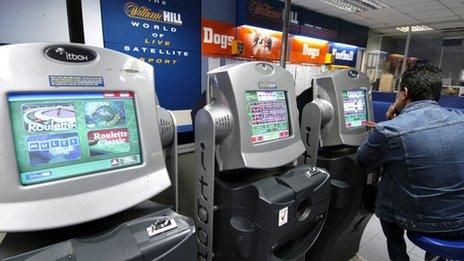Labour would give councils power to ban roulette machines
- Published
Ed Miliband: "Gambling machines cause debt and misery for families"
Ed Miliband has vowed to give councils the power to ban high stakes roulette machines from bookmakers' shops if Labour wins the next election.
Punters can bet up to £300 a minute on so-called Fixed Odds Betting Terminals.
Mr Miliband said they were "spreading like an epidemic" causing "debt and misery" and acting as a magnet for crime and anti-social behaviour.
He said Labour would amend planning and gambling laws so councils in England, Scotland and Wales could ban them.
He told BBC News fixed odds machines were "addictive for some people" and the gambling industry targeted poorer parts of the country.
"Somebody has got to step in and stand up to the betting industry," he added.
'Mini casinos'
There are over 33,000 FOBT machines making over £1.5bn each year for the big bookmakers - about half their annual profits.
Critics say the machines are highly addictive and lead to crime and poverty but the gambling industry says there is no hard evidence of this and have promised a new code of conduct to allow players to limit their own stakes.
The government has not ruled out taking action to cut the stakes and prizes on FOBT machines to make them less potentially addictive.
But it is awaiting the outcome of a study into how harmful the machines are to individual players, which is due to report next autumn.
It was changes to gambling legislation brought in by Labour that allowed bookmakers to start installing FOBT machines.
But Mr Miliband said the current limit of four per betting shop, had simply led to "clusters" of shops opening together, often operating from 7.30am to 10pm, with councils powerless to act.
Labour would legislate to put betting shops in a separate use class so that councils can use planning powers to control the number opening in their area - at the moment they are in the same class as banks.
The party would also review the number of high-speed, high-stakes FOBTs allowed on bookmakers' premises - including banning them altogether.
And it would take steps to make the machines less addictive by cutting time between plays, requiring pop-ups and breaks in play.

Mr Miliband said: "In towns and cities across Britain today, you can see how the old bookies are being turned into mini-casinos.
"In the poorest areas, these are spreading like an epidemic along high streets with the pawn shops and pay day lenders that are becoming symbols of Britain's cost-of-living crisis."
'Pull the plug'
He added: "In Newham there are 87 betting shops with an estimated 348 machines and across the five Liverpool constituencies there are 153 betting shops with around 559 FOBTs.
"This has huge consequences for our communities, causing debt and misery for families, and often acting as a magnet for crime and anti-social behaviour.
"But currently, there is almost nothing that can be done to stop the spread of FOBTs.
"Laws passed restricting betting shops to a maximum of four of these betting machines has meant more betting shops in clusters sometimes open from 7.30am to 10pm at night.
"The time has come to give local communities the right to pull the plug on these machines - the right to decide if they want their high streets to be the place for high stakes, high speed, high cost gambling."
The Liberal Democrats voted to give councils the power to limit the number of betting shops in their area at their party conference in September.
'Playing politics'
A spokesman for the Association of British Bookmakers said that while it was possible to bet up to £100 a spin, "hardly anyone does" and the industry was committed to helping problem gamblers.
"This announcement has nothing to do with helping problem gamblers; it is simply about playing politics with the jobs of 40,000 people, and the enjoyment of eight million people for no reason," said the spokesman.
But former betting shop manager Adrian Parkinson, of the Campaign for Fairer Gambling, welcomed Mr Miliband's announcement.
He said it was not just about curbing problem gambling as there was an equally big concern about the proliferation of bookmakers shops in deprived areas.
A string of local authorities have passed "symbolic" motions in recent months calling for FOBTs to be banned, he said.
He claimed the industry would be "dumfounded" by Mr Miliband's announcement as it believed it had escaped the threat of legislation.
- Published18 June 2013
- Published23 October 2013
- Published7 November 2013
- Published17 September 2013
- Published23 August 2013
- Published13 December 2013